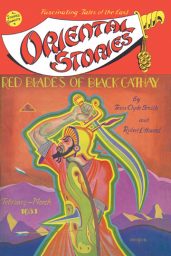 Military fantasy has antecedents that go back more than 80 years. Robert E. Howard had an interest in medieval warfare that showed in some of his fiction. “Kings in the Night,” “The Scarlet Citadel,” “Black Colossus,” and Hour of the Dragon all have set piece battles described in detail. One could add Howard’s crusader stories “Red Blades of Black Cathay,” “The Sowers of the Thunder,” “Lord of Samarcand,” and “Shadow of the Vulture also have action on a big scale.
Military fantasy has antecedents that go back more than 80 years. Robert E. Howard had an interest in medieval warfare that showed in some of his fiction. “Kings in the Night,” “The Scarlet Citadel,” “Black Colossus,” and Hour of the Dragon all have set piece battles described in detail. One could add Howard’s crusader stories “Red Blades of Black Cathay,” “The Sowers of the Thunder,” “Lord of Samarcand,” and “Shadow of the Vulture also have action on a big scale.
One novel that has military detail is Fletcher Pratt’s Well of the Unicorn (1948). It is one of the most overrated fantasy novels. Pratt was a writer of military non-fiction. He made the gaff in 1941 stating Japanese aviators were no serious threat.
Well of the Unicorn got a fair amount of press because it was one of the few fantasy novels from a time of few fantasy novels. Pratt was also part of the John W. Campbell stable for Unknown/Unknown Worlds. The novel is overwritten with too much boring dialogue. But, there are some battle scenes interspersed therein. There is a lot of 14th and 15th Century weapons, armors, and tactics present. So, on one hand you have to muddle your way through Pratt’s prose but rewarded with some well done action here and there. The novel appears to be fading away. The last reprint in the U.S. was in 1995 and the last U.K. reprint in 2001 proving it has failed to capture a following.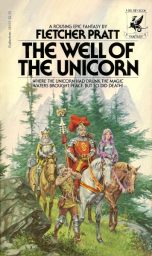
A friend of mine mentioned Brian Daley’s “Coramonde” books. The premise of The Doomfarers of Coramonde (1977) and The Starfollowers of Coramonde (1979) is a unit from an armored personnel carrier in the Vietnam War is magically transported to a fantasy world.”Twenty-four hours ago, he and his mane had been fighting off an ambush in a Viet Nam jungle. Now, thanks to some kind of magic spell, they were in the middle of this Fantasy Land that was filled with flying dragons, wizards, crazy castles and disposed princes. They were trapped here permanently, too– unless they could rescue the sorceress Gabrielle from the clutches of the master magician Amon. She was being held captive in Amon’s palace; and Amon’s palace was Hell itself!”
Daley’s novels seemed to have some popularity. I remember seeing them as Waldenbooks and B. Dalton Bookseller on the shelves into the early 1980s. Daley did a tour of duty during the Vietnam War.
As a segue, Jerry Pournelle’s Janissaries (1979) has a very similar set up with mercenaries transported from Africa to an earthlike planet by aliens. The technology level is medieval. There are some well-done battles. This series is more updated sword & planet than anything.
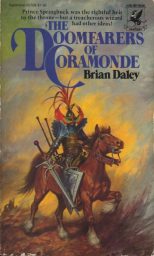
David Drake’s story “Ranks of Bronze” is another story that could just as easily have been fantasy. Aliens purchase Romans captured at the Battle of Carrhae. They engage in low technology warfare on other planets. Substitute sorcerers for aliens, and alternate fantasy worlds for planets, and the story could just as easily be military fantasy. Roman legionary fighting styles and tactics are well documented in this story and expanded novel.
Drake had a series about Vettius and Dama earlier in his career. These are sword and sorcery stories set in the 4th Century A.D. “Dragon’s Teeth” has a fight between Romans and Sarmatians. You can get both the original version of “Ranks of Bronze” and most if not all of Drake’s early sword and sorcery in Vettius and His Friends (Baen, 1988). David Drake: We want more Vettius and Dama stories.
I have mentioned that I am not a fan of Glen Cook’s “Black Company” novels. The first person, dialogue driven, almost non-existent description does nothing for me. I have a little tolerance for the novelettes but never finished a novel. For being a series about a mercenary unit, I don’t ever remember a description of weapons and armor. Fight choreography is rare. I find the world building wanting. There people out there who love the Black Company. For better or for worse, Cook’s series is a main progenitor for military fantasy.
I have read only one Elizabeth Moon story in Shattered Shields. I thought it to be possibly the best story, certainly the best example of military fantasy. I will be reading more of her in the future.
I have a problem with novels that go beyond 100,000 words. I have a big problem with series where each book is over 600 pages. Hence I have not read Steven Erickson’s Malazan books. A look at the isdb.org, shows succeeding novels getting bigger and bigger. The Malazan world is supposed to be from a role playing game. This is why the books are more never ending as opposed to being organic stories.
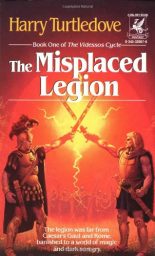 Harry Turtledove has a degree in Byzantine history. His four book “Misplaced Legion” serie has a cohort of Roman legionaries transported to a fantasy world similar to 11th Century Byzantine Empire. There is a pseudo-Battle of Manzikert in the first book.
Harry Turtledove has a degree in Byzantine history. His four book “Misplaced Legion” serie has a cohort of Roman legionaries transported to a fantasy world similar to 11th Century Byzantine Empire. There is a pseudo-Battle of Manzikert in the first book.
Turtledove’s Time of Troubles if a four book sequence reusing the 25 year long war between the Byzantine Empire and Sassanid Persian Empire from the early 7th Century. Videssos’ armies and tactics are Byzantine through and through.
Historical Novels
There are some historical novels with a military slant that are a potential source of inspiration.
Wallace Breem’s Eagle in the Snow is set during the Germanic barbarian crossing of the Rhine into the Roman Empire in December 406 A.D. It is in my top 10 list of favorite novels. If you have not read this book, do so immediately. I can’t recommend it enough. Breem had served in the Anglo-Indian Army until partitian and independence in 1947. 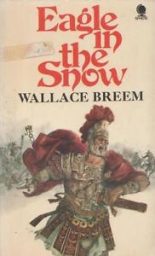
I have called R. F. Tapsell’s Year of the Horsetails as the greatest novel no one has read. It is a novel of genocidal war between a tribe of Slavs at the foot of the Carpathian Mountains and a Turco-Mongol steppe tribe during the Dark Ages. Tapsell had served in intelligence in the RAF.
Bernard Cornwell can get repetitive. Generally the first few books in a series are the best and then it begins to run down to potboiler status. His “Saxon” series is not without some merit. A tale of an Angle from Northumbria (Uhtred) raised by Norsemen in the 9th Century. Cornwell has some good descriptions of shield-wall warfare of the time. A TV series on the BBC now that I have not seen.
There might be others I have missed. Feel free to mention them in the comments.
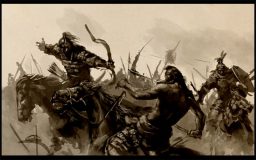
Historical military fiction has become something of a cottage industry here in the UK over the last ten years or so. There seem to be dozens of writers currently ploughing similar furroughs in adjacent fields. I tend to steer clear of most of them. I’d much rather read an old writer who produced a book occasionally when he had something to say rather than a new one contractually committed to an annual release come what may. That said, Robert Low’s Oathsworn books are well worth reading.
From the old school I’d heartily recommend all the books of George Shipway but particularly KNIGHT IN ANARCHY which, amidst all its other treats, does a splendid job of recreating the Battle of the Standard in 1138 when Anglo-Saxon axemen stood firm against the charging Scots whilst their Norman overlords broke in panic:
“But the front rank, the axemen whose grandfathers won Stamford Bridge, stood shoulder to shoulder and did not break. Enarmed shields rode high on biceps; the murderous axes rose and fell. A war shout like a clarion split the air.
“Out! Out!”
An utterly brilliant book.
His Agamemnon books, WARRIOR IN BRONZE and KING IN SPLENDOUR are also great.
I’d also draw attention to Graham Shelby’s THE EDGE OF THE BLADE, and Rosemary Sutcliff’s SWORD AT SUNSET which does a superb job of re-imagining post Roman warfare in Britain.
On the fantasy side mention must surely be made of Paul Kearney’s Monarchies of God, Sea Beggars and Macht series. I plug Kearney a lot here I know but, like they say in the ads, its only because he’s worth it.
Thanks for the tip regarding Shipway, Cro-Mag. Considering the used prices for Shipway and Tapsell, it looks like Castalia should publish both authors and do the world a favor.
-
Amen to that.
I should make the point that Breem’s EAGLE IN THE SNOW, Shipway’s IMPERIAL GOVERNOR and Tapsell’s YEAR OF THE HORSETAILS have all been reprinted in recent years, albeit in not very attractive editions. The Tapsell especially was issued in an awful and unwieldy album sized format. But at least it and the Breem, along with Shipway’s Walter Tirel and Agamemnon books, are available as Kindle downloads.
Regrettably the same cannot be said for other fantastic reads such as Tapsell’s SHADOW OF WINGS, Ronald Bassett’s THE CARTHAGINIAN and Vic Hurley’s THE PARTHIAN. Its little short of criminal that superb novels like these should languish out of print while publishers flood the market with so many facile imitations of them.